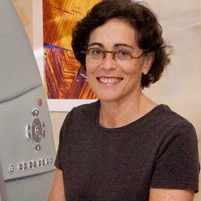Shattering Autism Assumptions

Marlene Behrmann doesn't play it safe. In a quest for answers, the Carnegie Mellon University professor of psychology and her colleagues recently published a study that blew apart a long and widely-held theory regarding autism's cause.
The controversial study involved the 'mirror neuron system' — a single neuron in this system responds both when an individual performs an action (e.g. picking up a raisin) and when the individual observes someone else performing the very same action. As autistic individuals have difficulty interpreting social cues, researchers had theorized that a malfunction of this mirror neuron system was a cause — or possibly even the cause — of the disorder.
Using a MRI scanner, Behrmann and her team compared the mirror neuron reactions of adults with and without autism. The subjects were asked to perform and observe a number of hand gestures, both repeated and varied. The result? No difference between the groups. However the researchers analyzed the data, the control and autism groups showed the same brain responses.
Behrmann believes their work has opened the door to more fruitful research, and she has wasted no time in moving things forward. After publishing another paper demonstrating disorganized and highly variable brain response in autistic individuals, her team has recently secured funding from the Simons Foundation to begin researching their new theory of 'canonical neural complications,' or malfunction in the neural system itself.
"Undoubtedly, this is an enormous problem," said Behrmann. "The incidence figures are huge, and not only does autism affect the child, it affects the family and the community. I think we have a social and moral obligation to really undertake the investigation of autism from identification — as early as possible — all the way through to intervention."
Behrmann, a South African native, came to Carnegie Mellon in 1993.
"I thought I'd probably just be here for a short time and here I am 17 years later," she said with a smile. "For somebody like me, whose research interests aren't firmly rooted in a conventional discipline, CMU is really a perfect place. It's interesting and eclectic. I've always said the membranes between disciplines are semi-permeable at CMU."
She and her team are also grateful to enjoy the proximity and close collaboration with the University of Pittsburgh.
Not surprisingly, Behrmann has encouraged undergraduates from across Carnegie Mellon to become involved in her research, where they have regular and close contact with Behrmann and the other researchers and graduate students doing cutting-edge work.
"Currently, I have undergraduates from computer science, biology and psychology working in the lab," she said. "Students are able to contribute to the research project or spin-off a piece, have ownership and develop that. Some of them have been extraordinarily successful and have made great contributions."
She added, "I think it would be extremely difficult to do my work in another university. Without these multi-disciplinary resources, it's very hard to get this work done."
Related Links: Behrmann's Bio | Psychology | Simons Foundation Autism Research Initiative
